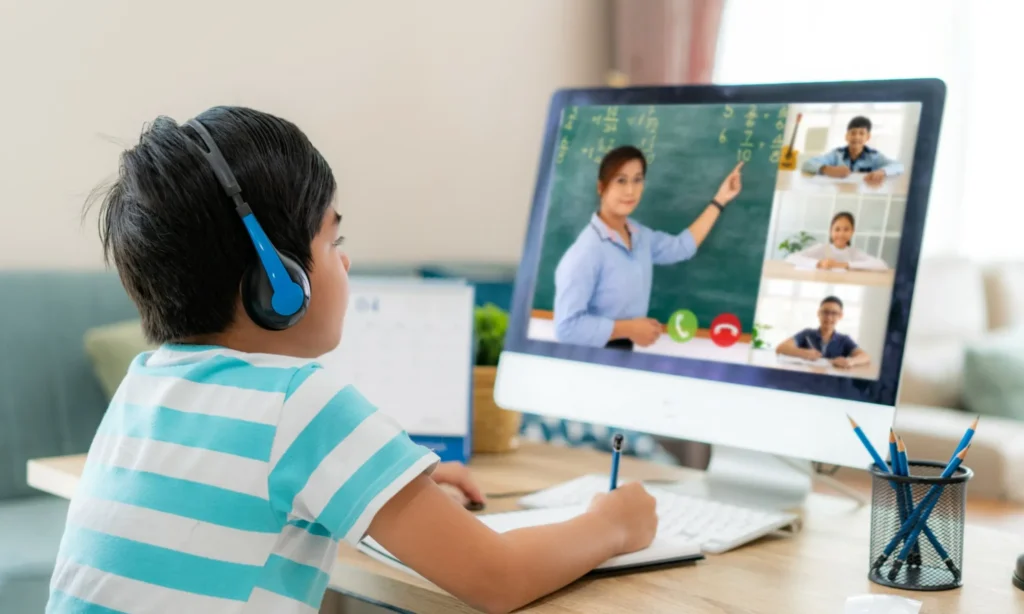- Understanding the basics of language acquisition
- Creating an English-friendly environment at home: 3 tips for parents
- How to incorporate English into your daily life?
- Provide online and offline learning opportunities
- Be supportive and patient with your child's English language learning
Learning English is not just an academic pursuit; it’s a gateway to global opportunities, especially for children. As parents, your involvement can make a significant impact on your child’s English language acquisition.
Whether you are proficient in English or not, you can still foster an environment that encourages your child to learn. This article will explore the foundations of language learning, practical tips for creating an English-friendly home, and the importance of providing diverse learning opportunities, both online and offline.
Understanding the basics of language acquisition
The journey to language mastery involves several key components: time, dedication, and motivation. You don’t become fluent overnight. Consistent practice and exposure are necessary, along with a structured learning environment that aligns with your child’s age and cognitive abilities.
The stages of language learning
We can identify five stages of language learning that are present in children’s self-development. These stages include:
- Silent Period: Initial exposure where the child listens more than speaking.
- Early Production: The child can speak a few words and phrases.
- Speech Emergence: Basic sentences start to form.
- Intermediate Fluency: Capability to hold basic conversations.
- Advanced Fluency: Near-native level proficiency.
The importance of age in language acquisition
Bilingual children, who start learning English along with their native language from an early age, find it easier to learn new languages in the future. A study from Haifa University confirms this fact.
This is due to the fact that they are already familiar with two different language structures, which makes it so much easier to incorporate another new language. The skills required for learning a language have already been developed, and therefore introducing a third one is a much smoother process for them.
Younger brains are more receptive to languages, making early exposure beneficial. For bilingual children, mastering English alongside another language enhances cognitive abilities, helps problem-solving and offers broader communication skills. The earlier you start, the better the outcomes.
Creating an English-friendly environment at home: 3 tips for parents
Here are 3 practical tips for parents on how to create an English-friendly environment for their kids, that will encourage them to learn the language in a stress-free way:
- Exposure Through Multimedia: Try watching English cartoons, listening to music, and movies to introduce new words and phrases. Shows like “Peppa Pig” or “Sesame Street” can be both educational and entertaining.
- Reading English Books Together: Start with picture books and gradually move to children’s stories like “The Chronicles of Narnia” or “Harry Potter.” Reading out loud can help with pronunciation and vocabulary.
- Playful Learning: Games like ‘Scrabble’ or apps like ‘Duolingo for Kids’ can make learning fun. Interactive toys that speak or sing in English can also be useful.

How to incorporate English into your daily life?
Incorporating English into daily activities maintains a sense of routine and keeps the family engaged. This immersion technique is an excellent way to maintain and build upon what your child learns in a more structured setting.
Making English a routine
Normalizing the use of English at home can be incredibly beneficial. During meal times, discuss your day or what you’re eating in English. At bedtime, read English stories to your child or encourage them to describe their day in English. During playtime, interact using simple English phrases or songs. These constant micro-interactions contribute to long-term language retention.
Labeling household items
A great way to visually reinforce vocabulary is to label household items with their English names. For example, stick a label that says “Fridge” on the refrigerator or “Window” on the window. This method employs the Natural Language Processing (NLP) principle of semantic learning, which involves understanding the meaning behind words in a contextual environment.
Encouraging English-speaking playdates
Create opportunities for your child to speak English with their peers. These playdates could be online or offline, and they help children become comfortable using English in social settings, which is crucial for language development.
Provide online and offline learning opportunities
Another thing to consider when helping your little student with learning English at home is a comprehensive approach, that is vital to ensure all-round development in English language skills. Focus on both online and offline activities to keep your child engaged.
Enrolling in English classes
Structured learning environments like English classes offer a step-by-step approach to language learning. Interactive online lessons with native speakers, such as Novakid, provide fast-paced, 25-minute sessions for maximum retention. Your child can access these from anywhere, offering flexibility and reducing the time spent on commuting.
Learning English should be entertaining for children. By making the educational process a fun, play-based learning activity, children will engage and immerse themselves in the activity.
“A good option is to start with games in English and let the children know that ‘we will play and learn together.’ Over time, this game can grow into something more, and at some point you will say: ‘This is quite fun, let’s play this English game more often!’. But it is important to take small steps” – says Novakid’s CEO Max Axarov.
Using technology and apps
The digital age has provided us with endless resources to learn a new language. Some of the best English-learning apps for kids include Duolingo, Rosetta Stone for Kids, and ABCmouse. These apps offer lessons in a game-like environment, keeping your child engaged.
Participate in local English events or workshops
Many communities offer English-based events like storytelling sessions, library programs, or meet-ups with native speakers. These events give your child the chance to practice their English in an immersive setting.
Be supportive and patient with your child's English language learning
Always provide support to your child during the language learning process, as it may take a considerable amount of time to reach proficiency.
- Celebrate small achievements: Recognize and celebrate milestones, even if they seem insignificant. Whether it’s learning a new word or constructing a simple sentence, positive reinforcement goes a long way.
- Avoid negative reinforcement: Negative reinforcement can be a barrier to learning. It’s crucial to encourage, not discourage, as your child navigates the complexities of learning a new language.
- Understand and respect the child’s individual pace: Every child is unique. Some might pick up English quickly, while others may take more time. Being patient and allowing your child to learn at their own pace creates a positive learning environment.
Parents play a pivotal role in their child’s journey of learning English. By incorporating English into everyday routines, and encouraging English-speaking social interactions, parents can lay a strong foundation.
Online e-learning platforms like Novakid and mobile apps offer flexibility and interactive learning, while community events provide real-world practice. Support, patience, and understanding your child’s individual learning pace can make the process not only effective but also enjoyable.
They say that actions speak louder than words. Indeed, Novakid teaching approach has been highly ranked for its user-friendly interface, individual curriculum and professional teachers. Parents usually see that their kids enjoy learning English, because each lesson is tailored for every child.
Even if you’re not fluent in English, these strategies can significantly help your child become proficient and open up a world of opportunities for them. Start implementing them today!







































I am interested in learning more about what your group offers.